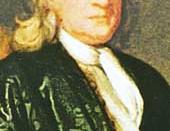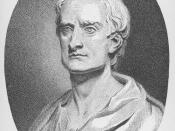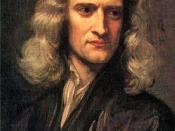Sir Isaac Newton was a Universal Genesis Isaac Newton was born January 4, 1643. He attended Free Grammar School and was described by teachers and classmates as 'idle' and 'inattentive.' Also, school reports showed that he had very little academic promise. His mother took her young son out of school to help run their family estate, since he was showing very little progress with his schoolwork. Newton showed no promise or interest at running the estate either. With a little help from an uncle, Isaac was allowed to return to Free Grammar School in 1660 to prepare for entering a university. On his return, Isaac Newton showed that he did have academic promise, shocking all of his teachers and fellow classmates. In 1661 he enrolled in Trinity College Cambridge. While visiting a fair in Cambridge in 1663, Newton bought an astrology book and found that he could not understand the mathematics in it.
So he bought Barrow's Edition of Euclid's Elements to teach himself geometry. Newton's aim at Trinity was a law degree, but his fascination and curiosity in mathematics led him in a different direction (Newton Network 1-11).
In the summer of 1666, the young Newton sat down beneath a tree in his mother's orchard to concentrate on his studies, when an apple landed on his head. This led the twenty-three year old to start thinking about moving objects (White 5). Newton soon learned that motion is made up of three qualities: velocity, acceleration, and momentum (Benford 848). Newton's first law of motion was the "law of inertia." According to Fizzics Fizzle: Beginner, "Every body continues in its state of rest of uniform speed in a straight line unless it is compelled to change that state by forces acting on it" (1). What this means is that if...


